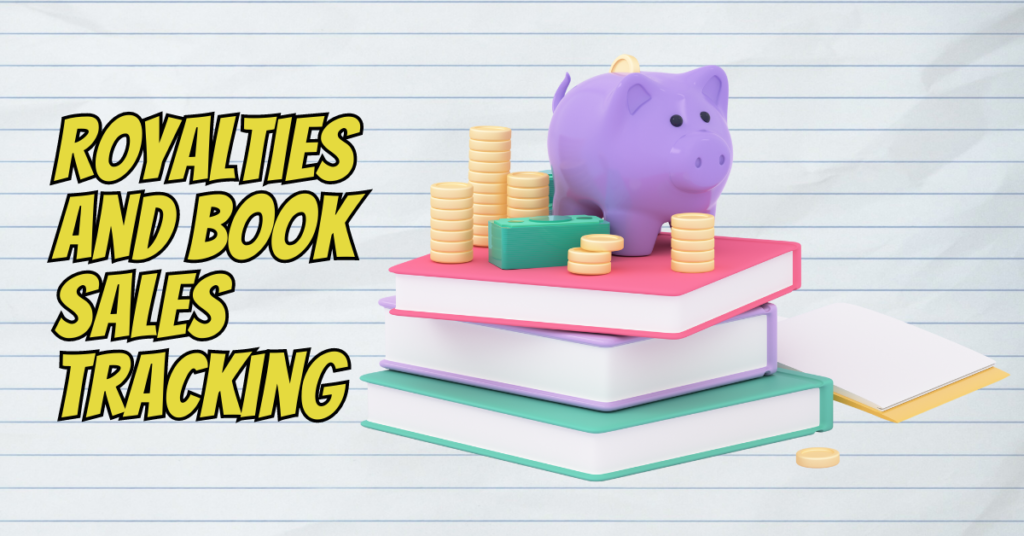For authors in the publishing industry, understanding royalties and book sales tracking is essential to track the financial success of their books. Royalties are the earnings authors receive from the sales of their books, and book sales tracking allows authors to monitor the performance and popularity of their work. This article will explore the concept of royalties, the process of tracking book sales, and the tools available to authors for managing their earnings.
Table of Contents
What Are Royalties?

Definition of Royalties
Royalties are the earnings that authors receive from the sale of their books. When a book is sold, a percentage of the book’s retail price, known as the royalty rate, is paid to the author for their work. Royalties serve as the primary source of income for authors and are a critical financial aspect of the publishing industry.
Types of Royalties
There are different types of royalties authors may earn, depending on the publishing agreement and the format of the book:
- Print Royalties: Print royalties are earned from the sales of physical copies of books, such as hardcovers or paperbacks. The royalty rate is typically a percentage of the book’s retail price.
- E-book Royalties: E-book royalties are earned from the sales of digital copies of books. The royalty rate for e-books can vary and may be a percentage of the book’s retail price or calculated based on a flat fee per unit sold.
- Audiobook Royalties: Audiobook royalties are earned from the sales of audiobook editions of books. The royalty rate for audiobooks may be calculated based on a percentage of revenue or a fixed amount per unit sold.
- Translation and Foreign Rights Royalties: Authors may also earn royalties from selling translation rights or foreign editions of their books. These royalties are based on agreements with publishers in different countries and can vary depending on the specific terms.
Royalties and Book Sales Tracking
Importance of Book Sales Tracking
Book sales tracking allows authors to monitor the performance and popularity of their books in the market. By tracking sales, authors can assess the effectiveness of marketing strategies, gauge reader response, and make informed decisions regarding future writing and publishing endeavors. It provides authors with valuable insights into their readership and helps them understand the financial impact of their work.
Methods of Book Sales Tracking
There are several methods authors can use to track book sales:
- Publisher Reporting: Traditional publishers often provide authors with regular sales reports that detail the number of copies sold, royalties earned, and other relevant information. Authors should familiarize themselves with their publisher’s reporting schedule and the specific format of the reports.
- Retailer Dashboards: Authors who self-publish or utilize online platforms can access retailer dashboards, such as Amazon KDP or Barnes & Noble Press, which provide real-time sales data and earnings reports. These dashboards allow authors to track sales across different formats and geographic regions.
- Sales Reporting Services: Some services and tools specialize in aggregating sales data from various retailers and platforms, providing authors with comprehensive sales reports in one centralized location. These services may require authors to grant access to their sales data from different retailers.
- Financial Software: Authors can use financial software or spreadsheets to track their book sales and calculate their earnings manually. This method requires authors to input sales data from various sources and maintain organized records.
- Third-Party Analytics Tools: There are analytics tools available that offer detailed insights into book sales, including sales trends, geographic distribution, and reader demographics. These tools can help authors analyze sales patterns and make data-driven decisions.
Managing Royalties and Earnings
Financial Recordkeeping
Authors should maintain accurate financial records to manage their royalties and earnings effectively. This includes keeping track of book sales, royalties received, and related expenses. Organized recordkeeping ensures that authors can monitor their income, calculate tax obligations, and evaluate the financial performance of their books.
Collaboration with Accountants or Financial Professionals
Authors may collaborate with accountants or financial professionals specializing in the publishing industry. These professionals can offer guidance on royalty management, tax planning, and financial strategies tailored to an author’s needs. They can also help authors navigate complex royalty structures, foreign earnings, and other financial considerations.
Understanding Royalty Statements
Royalty statements are documents publishers or retailers provide outlining sales and earnings for a specific period. Authors should carefully review royalty statements to ensure accuracy and understand the calculation of their royalties. Authors must familiarize themselves with their publishing agreements’ terms and royalty structures.
Contractual Obligations and Rights Management
Authors should know their contractual obligations regarding royalty reporting and rights management. Publishing agreements typically include provisions for reporting periods, payment schedules, and any royalty calculations or deductions restrictions. Authors should consult their contracts and seek legal advice for questions or concerns.
Frequently Asked Questions (FAQs)
How are royalty rates determined?
Royalty rates are determined through negotiation between authors and publishers. The specific rates can vary depending on the author’s track record, genre or marketability, and the publishing format (print, e-book, audiobook). It is essential for authors to carefully review royalty terms in their publishing agreements and seek clarity on how rates are calculated.
When do authors receive royalty payments?
The timing of royalty payments varies depending on the publishing agreement. Traditional publishers typically have regular payment schedules, such as twice a year or quarterly, while self-publishing platforms may offer monthly payments. Authors should refer to their publishing agreements or retailer platforms to understand payment terms and schedules.
Can authors track sales of their books internationally?
Yes, authors can track sales of their books internationally, especially with the availability of online platforms and retailer dashboards. Authors should ensure they can access sales data from different regions
and utilize tools or services that track global sales. Tracking international sales allows authors to understand their readership reach and potential opportunities for foreign rights licensing.
How can authors maximize their royalty earnings?
Authors can maximize their royalty earnings by focusing on marketing and promotion strategies to increase book sales. This can include effective book launches, targeted advertising, social media engagement, and collaborations with influencers or book clubs. Additionally, authors may explore opportunities for translations, foreign editions, audiobooks, or licensing deals to expand their reach and revenue streams.
Are authors responsible for reporting royalties on their taxes?
Yes, authors are generally responsible for reporting their royalty earnings on their taxes. Royalties are considered income and should be informed accordingly. Authors should keep accurate financial records, consult with tax professionals, and familiarize themselves with their jurisdictions’ tax laws and regulations.
Can authors negotiate royalty terms in their publishing agreements?
Authors can negotiate royalty terms in their publishing agreements, especially for certain rights or formats. Authors should be prepared to advocate for favorable terms and consult with literary agents or legal professionals to ensure their interests are represented in the negotiation process.
Conclusion
Understanding royalties and book sales tracking is essential for authors to effectively manage their earnings and gauge the success of their books. Authors can gain valuable insights into their work performance by comprehending the various types of royalties, tracking sales through different methods, and maintaining organized financial records. Managing royalties and earnings allows authors to make informed decisions, evaluate their publishing strategies, and confidently navigate the industry’s financial aspects.





